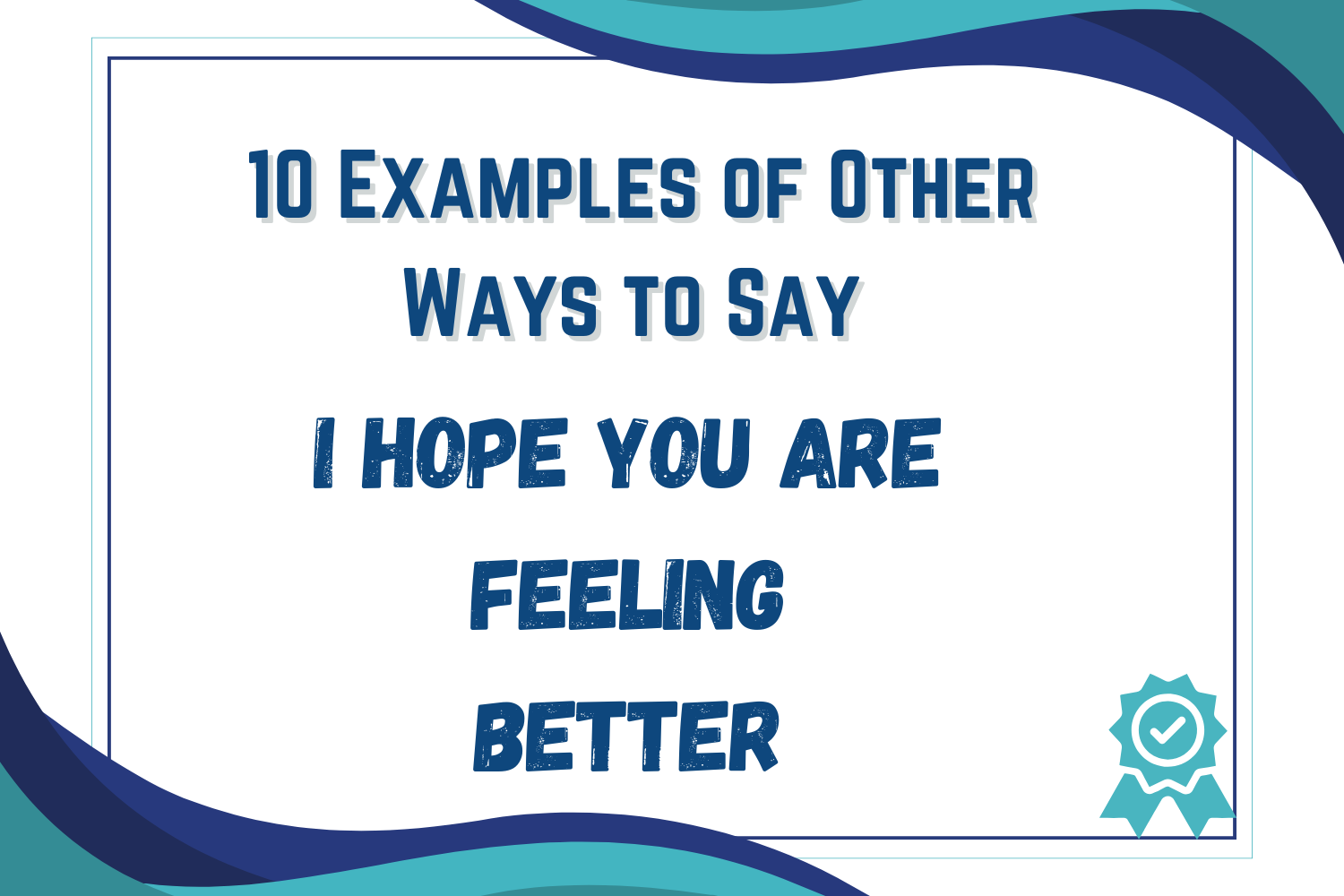When it comes to thoughtful communication, expressing concern and empathy in various ways enhances clarity and engagement. This article provides comprehensive examples, tips, and cultural considerations to enrich your interactions, whether personal or professional.
So, what are other ways to say “I hope you are feeling better”? Alternatives include “Wishing you a speedy recovery,” “Thinking of you during this time,” and “Sending healing thoughts your way.” These phrases convey similar sentiments while offering varied tones suited to different contexts.
Read on to discover detailed scenarios, concise communication tips, and cultural nuances to elevate your language skills and show genuine care in any situation.
Why Expressing Empathy Matters
Effective communication isn’t just about words—it’s about conveying genuine concern and understanding. Using varied expressions not only prevents repetition but also shows deeper emotional intelligence, especially in professional settings or multicultural interactions.
Different Scenarios and Phrases
1. For a Colleague or Professional Contact
- Example: “I hope your recovery is swift and smooth.”
- Description: This phrase maintains a professional tone while showing genuine concern. Ideal for workplace communications, it conveys empathy without being overly personal. It’s concise yet heartfelt, which helps maintain boundaries in professional relationships.
2. For a Close Friend
- Example: “Take all the time you need to heal. I’m here if you need anything.”
- Description: This expression is warm and supportive, perfect for a friend. It reassures them that they are not alone, offering practical and emotional support. It encourages open communication and builds trust.
3. For a Family Member
- Example: “Sending you love and positive thoughts for a quick recovery.”
- Description: This phrase emphasizes emotional connection. It’s both comforting and uplifting, reflecting the deeper bond shared within families. The inclusion of “love” makes it personal and reassuring.
4. In a Formal Letter or Email
- Example: “Wishing you a full and speedy recovery.”
- Description: This version is formal yet caring, suitable for official correspondence. It strikes the right balance between professionalism and empathy, ensuring the message is respectful and supportive.
5. When Communicating with Someone from Another Culture
- Example: “I hope you are finding strength each day.”
- Description: This phrase is culturally sensitive and neutral. It focuses on resilience, which is valued in many cultures. Avoid idiomatic expressions or overly casual language when unsure of cultural norms.
6 For Professional Settings:
- “Wishing you a smooth and speedy recovery.”
Conveys concern while maintaining a formal tone. - “I hope each day brings you closer to full recovery.”
This is polite and supportive, appropriate for workplace relationships. - “Please take the time you need to recover fully.”
Shows respect for their well-being and time, especially for colleagues.
7 For Friends and Close Contacts:
- “I’m thinking of you and sending healing vibes your way.”
Warm and casual, perfect for a friend. - “Take care of yourself—you mean a lot to me.”
Personal and direct, it reinforces the value of your relationship. - “Remember, healing takes time. I’m here for you.”
Encouraging and supportive, offering emotional presence.
8 For Family Members:
- “You’re in my thoughts; I know you’ll get through this.”
Reassuring and emotionally connected. - “Sending all my love for a quick recovery.”
Simple and heartfelt, emphasizes emotional support. - “Rest well and know that we’re here for you.”
Provides comfort and reassurance, ideal for close family.
9 For Formal or Written Communications:
- “I wish you a full and restful recovery.”
Polite and concise, suitable for cards or formal notes. - “May you regain strength and health soon.”
Elegant and compassionate, fitting for formal letters. - “Hoping this message finds you on the mend.”
Polite and subtle, appropriate for written correspondence.
10 For Multicultural Contexts:
- “Wishing you peace and strength during your recovery.”
Neutral and respectful, avoids cultural idioms. - “May each day bring you renewed health and spirit.”
Focuses on positivity, suitable for diverse backgrounds. - “I hope you are finding comfort and progress each day.”
Reflects a supportive tone without being overly personal.
Tips for Clear and Engaging Communication
1. Be Sincere and Specific
Tailor your message to the situation. Generic phrases might seem impersonal, so adding a specific detail about their situation can show genuine care.
2. Keep It Concise
Especially in professional settings, concise messages are more impactful. Avoid long-winded sentences; focus on clear and heartfelt language.
3. Consider Cultural Sensitivity
Different cultures interpret phrases differently. For example, “Get well soon” might be common in Western cultures but may seem too casual in others. Research and adapt accordingly.
Tips for Language Learners
- Practice with Context: Understand how different phrases fit into various scenarios.
- Learn Common Synonyms: Build your vocabulary with alternatives like “recover,” “heal,” and “well-being.”
- Avoid Literal Translations: Some expressions may lose meaning when translated directly. Use culturally appropriate phrases.
Conclusion
Expressing empathy and concern thoughtfully can strengthen personal and professional relationships. By exploring diverse ways to say “I hope you are feeling better,” you can communicate more effectively and sensitively. Remember to consider context, cultural differences, and the recipient’s emotional state for the most impactful message.
This guide equips you with practical examples and insights to enhance your communication skills—ensuring your messages resonate with warmth and sincerity.




